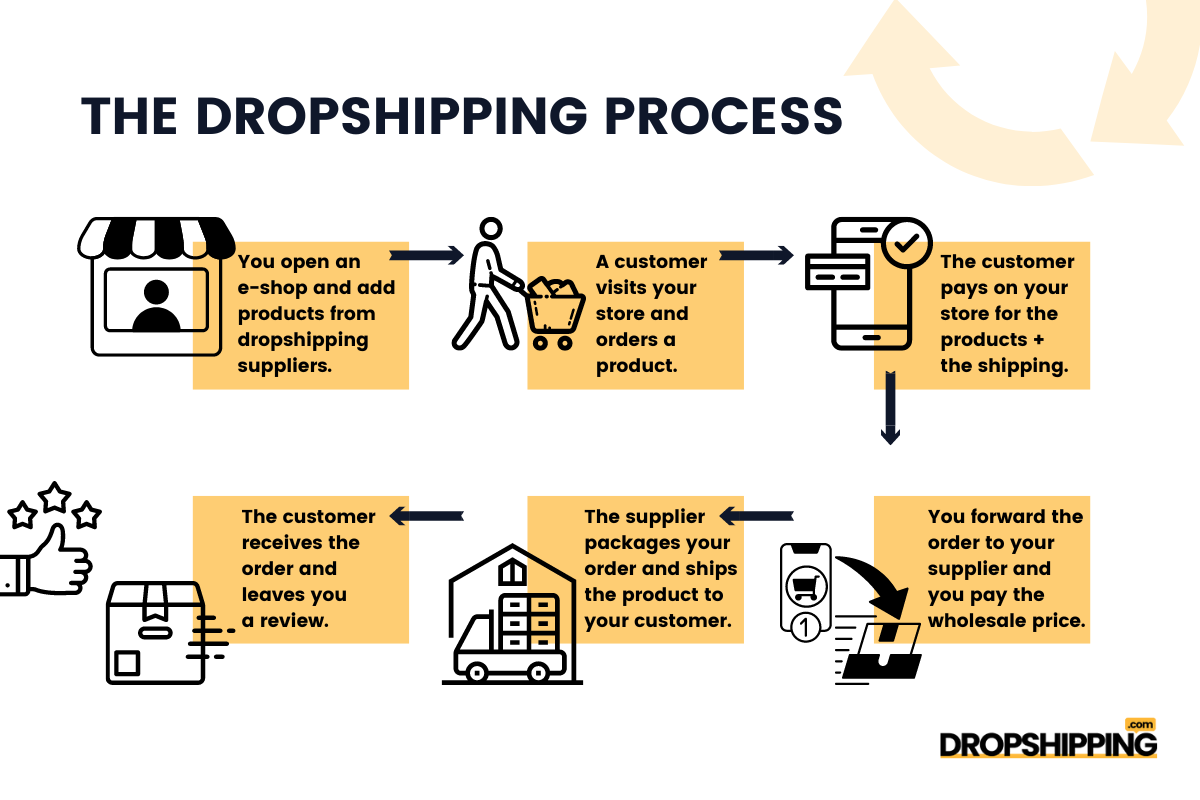Importance of Supply Chain Management When Dropshipping
Today, dropshipping is very popular because it gives you the opportunity to start your own business at low cost. According to research, approximately 23% of all online sales are precisely on it.
If you have landed on this page, then you want to start this path. Or you, as an already experienced dropshipper, want to finally understand the issues of supply chain management in dropshipping. Don’t worry, we’ll explain everything now.
In this article, we will open the veil of secrets and talk about the importance of proper supply chain management in dropshipping, the features of work, helpers in the form of software, and show what a successful supply chain looks like. Here we go.



Table of Contents
What Is Dropshipping and How It Works

Dropshipping is an attractive delivery model for retailers that allows you to start an e-commerce business with minimal investment, quickly and efficiently.
The retail sale of goods according to the classic dropshipping scheme requires the retailer to have a warehouse, a logistics system, and specialists in the state. But if you are a beginner retail dropshipper, then you can do it without specialists, and instead of a warehouse, you can use your own garage. But the logistics system is needed in any case.
The classic supply chain looks like this:
- producer – produces goods and sells them in large quantities;
- wholesaler – buys goods from the manufacturer, makes his markup on them, and sells to the retailer in smaller lots;
- retailer – buys goods from a wholesaler, makes a margin, and sells goods individually or in small lots to the final buyer.
As a retail dropshipper, you can order products from both the wholesaler and the manufacturer directly. It all depends on your budgets, wishes, goals, and other similar factors.
If you are engaged in one specific group of goods, for example, the sale of equipment for cafes and restaurants, then it is more profitable for you to deal directly with the manufacturer or his representatives.
But if we are talking about smaller goods, where a large assortment is important, we will have to deal with different suppliers, which means that many questions and problems arise.
That is the more different types of goods you have, the more suppliers you will have to interact with. So without proper management, you will simply get confused about everything you can get confused.
But whether you choose to work with your manufacturing or wholesale suppliers, the importance of optimal supply chain management is invaluable.
What Is Supply Chain Management?
Supply chain management – SCM – is essentially the entire path that a product takes from the production process to the final customer. But, if we consider only a retail dropshipper who does not cooperate with the manufacturer, just purchases products from wholesalers, the “supply chain” is limited and looks like this:
wholesale supplier → retail dropshipper → customer
With the globalization of the dropshipping market and the value of providing a great service, supply chain management has become a prerogative, as each party is responsible to the other and wants to establish an optimal relationship. In addition, SCM is an opportunity to be more efficient and productive, as it is a great tool for process optimization.
The presence of SCM at all participants in the supply chain allows you to fully control the entire path without a long expenditure of resources, a large number of employees, and critical errors.
For you, as a retail dropshipper, the opportunity opens up to deal exclusively with the marketing part and finding customers, and all the problems with logistics and products will lie on the shoulders of the wholesaler. But at the same time, both parties will benefit because all processes will be delegated to the supply chain management system. It remains only to configure it.
We hope you understand what supply chain management is, and now let’s move on to its value.
👉 Learn about What DAP Means? – Understand Delivery At Place In Shipping
The Value Of Supply Chain Management For Dropshippers
So, what is the value for drop shippers of such an intricate definition of “supply chain management”:
- Exclusion of the possibility of returning goods: if you, as a dropshipper, work without your own warehouse and ship goods directly from the wholesaler, SCM will minimize the risk of returns. After all, each party will have a clear idea of the order, its quality, and its features.
- Minimizing the risk of being out of stock: having an established SCM, you will be able to clearly understand which group of goods you are running out of, which stocks need to be replenished, etc.
- Inventory cost management: Since the cost of a retail dropshipper’s inventory is the largest cost line, it is very important to manage it properly. With the help of management, you can easily control demand forecasting, optimize storage costs and maintain an optimal balance between budget, orders, and purchases. In addition, it will eliminate “dead goods”, as well as shortages and capital costs for transportation costs.
- Ability to win the trust of your customers: When you have an optimized supply chain, you will always have what your customers need. And this directly affects customer satisfaction.
- Gain a competitive edge: With SCM, you save money, buy more of the products your customers need, and plan and meet customer expectations. All this leads to the fact that your income grows, and customer loyalty increases, which means you stand out from your competitors significantly.
As you can see, the value of supply chain management for drop shippers is high.

Supply Chain Management for Dropshippers
A successful supply chain consists of the following elements:
- Demand forecasting;
- Inventory planning;
- Logistics;
- Warehouse management.
Each of these elements has a complex structure. But if we look closely at the overall chain system, we will realize that effective management is not possible without the participation of all links of the dropshipping scheme.
In addition, effective management is impossible without high-quality, customized software. Let’s consider each item.
Demand Forecasting
Before forecasting demand, it is necessary to check the product that is planned to be introduced into the assortment. It is necessary to check it for competitiveness with the help of special tools. Only then can demand be predicted. Any forecast is based on data.
The main source of this data is the seller’s database. You, as a retail dropshipper, should also use your CRM system to interact with your customers. This will allow you to get all the necessary data about the channels through which customers come, their interests, wishes, sales seasonality, etc.
It is also you who should plan and conduct marketing activities, due to which demand will grow. As we wrote earlier, with an optimized supply chain management, the main task for you will remain to deal only with your own customers and marketing campaigns, and everything else can be partially delegated to SCM and the wholesaler.
The main thing is to analyze all the data received from the management system and successfully regulate the quality and supply of goods.
Demand planning based on individual software is also good because systems are developed flexibly. That is, if there is a sharp increase in demand for reasons beyond the control of you in the scheme, the system can predict the need for the number of goods based on new data.
Inventory Planning
Inventory planning at the supplier’s warehouses will directly depend on demand forecasting. But demand is not the only indicator, and the retailer is not the only player that influences inventory. There is also a manufacturer with its own capacities and resources. The seller may predict very high demand for a particular product in the next quarter, for example, a seasonal surge in sales.
The supplier will schedule inventory that will cover this growth. But the manufacturer may simply not have the resources if he does not manage his processes. Most often, ERP systems are used for such planning. They allow you to accurately plan production and inventory management based on the company’s available resources. But this is only true for those retailers who only deal directly with manufacturers.
The exact same stock issue can occur with the wholesalers you partner with as a retail dropshipper. You need volume and the wholesaler simply can’t provide it, requiring you to find a new supplier or lose your customers. To avoid such incidents, an SCM is needed, which will allow you to control all the wholesaler’s stocks in order to regulate deliveries in advance and eliminate any risks.
Another effective inventory management software is a system that allows you to reallocate resources based on data and optimize the use of inventory. The same systems, based on data coming from outside, make it possible to plan the replenishment of stocks of goods in warehouses in a timely manner. At the time of the increase in demand, all participants in the dropshipping scheme could satisfy the needs of their buyers.
Logistics
If we are talking about dropshipping, then it is advisable to use special transport services to deliver goods to the end buyer. Much, but not all, depends on the competent selection of a contractor.
As a retail dropshipper, it is important for you to find a good service for sending packages. But how will the goods be sent to your warehouse? Will it be beneficial for you? This issue also needs to be thought out in advance.
Perhaps it will be taken over by the seller-manufacturer or seller-wholesaler. And you may need to think about it.
In any scenario, a supply chain management system will help you control the process of sending and delivering goods, both from the seller and from you to the buyer.
You can always change the data, see exactly where the goods are stuck, and how you need to change the logistics if there are problems.
Properly thought-out logistics in a composite with an effectively configured supply chain management tool guarantees you the elimination of any problems.
And if your client asks why his order is delayed, you can definitely name the reason and assure that he will receive everything soon, and not counter with ridiculous excuses and accusations towards the transport service.
Warehouse Management
Another important component of the dropshipping scheme. Warehouses of intermediary companies should be optimized, as well as all processes in them. An efficient inventory storage and shipment planning system helps to reduce your own storage costs.
A ready-made SCM tool will allow you to have a complete picture of what is stored on your shelf, minimizing all the costs, errors, and problems that can be associated with it. Isn’t it wonderful?
Order Management
This is one of the most difficult and time-consuming processes when using dropshipping. If your warehouses work with dozens and even hundreds of contractors, all shipments on orders must be accompanied by documents under your logo and not a wholesaler.
In addition, all your orders are retail, so you can’t do without switching to fundamentally new order management tools at the shipment stage. Even if the sales volumes are small, when everything is automated, you do not have to spend a lot of time and other resources.


Dropshipping Supply Chain Management Software
I have listed how many different management systems companies need in order to ensure the efficient functioning of the supply chain. To work in different systems, specialists will use programs that use similar data from databases. But the transfer of this data from one system to another takes a certain time, in addition, the risk of losing or leaking important information increases.
Developer companies offer businesses using dropshipping the development of individual programs. Their advantage is that the system is developed to solve specific problems. Development based on the source data build a separate software.
What can such software solutions:
- Collection and processing of sales data, and sales analysis;
- Sales forecasting in the short term using AI;
- Procurement planning to cover needs in real-time;
- Analytics to predict sales ups and downs for more efficient warehouse management and logistics planning;
- Creation of template purchasing cards, procurement planning;
- Creation of separate templates for each counterparty, seller, and retailer.
Such efficient supply chain management methods are almost completely automated. As a result of the introduction of complex systems integrated with each other, more accurate and faster supply planning is achieved.
Such management is extremely important not only directly for the dropshipper involved in the shipment of goods. The more efficient the management, the more reliable the supplier is for both the manufacturer and the retailer.
Therefore, the management system improves the efficiency of the entire chain and customer satisfaction. Thus, competent management increases the profitability of the business and contributes to the growth of its profitability.













![The Top 21 3PL Companies Compared [2024 List & Guide]](https://images.weserv.nl/?url=https://prod-dropshipping-s3.s3.fr-par.scw.cloud/2024/03/Frame-3922469.jpg&w=420&q=90&output=webp)